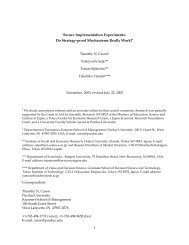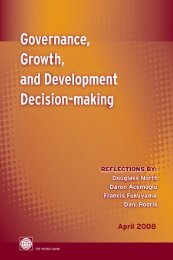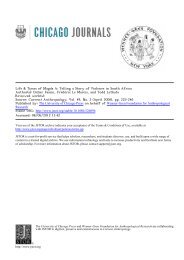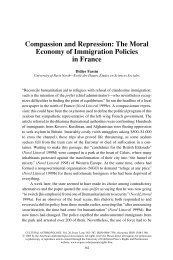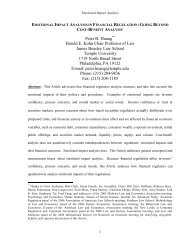The Tools of the Master Slavery and Empire in Nineteenth Century ...
The Tools of the Master Slavery and Empire in Nineteenth Century ...
The Tools of the Master Slavery and Empire in Nineteenth Century ...
You also want an ePaper? Increase the reach of your titles
YUMPU automatically turns print PDFs into web optimized ePapers that Google loves.
THE TOOLS OF THE MASTER 11<br />
towards Islamic despotism, that <strong>the</strong> <strong>in</strong>ferior position <strong>of</strong> women <strong>in</strong> Muslim societies proved<br />
Islam’s <strong>in</strong>compatibility with social reform, <strong>and</strong> progress. With<strong>in</strong> <strong>of</strong>ficial British circles, particularly<br />
those concerned with adm<strong>in</strong>ister<strong>in</strong>g Egypt <strong>and</strong> <strong>the</strong> Sudan, slavery was understood<br />
to remove all opportunities for real family life from slaves even after <strong>the</strong>y were freed. Fears<br />
circulated about manumitted Sudanese women turn<strong>in</strong>g to prostitution <strong>in</strong> <strong>the</strong> streets <strong>of</strong><br />
Cairo; <strong>the</strong>se fears lay beh<strong>in</strong>d <strong>the</strong> found<strong>in</strong>g <strong>of</strong> <strong>the</strong> Cairo Home for Freed Women by Lord<br />
Cromer <strong>in</strong> 1886, two years after <strong>the</strong> creation <strong>of</strong> <strong>the</strong> Slave Trade Bureaus.<br />
<strong>The</strong> debate over marriage <strong>and</strong> family was conducted just as fiercely <strong>in</strong> Egypt, especially<br />
after <strong>the</strong> 1897 publication <strong>of</strong> Qasim Am<strong>in</strong>’s Tahrir al-Mar’a (<strong>The</strong> Emancipation <strong>of</strong> Women)<br />
which pleaded for <strong>the</strong> social emancipation <strong>of</strong> Egyptian women. <strong>The</strong> customary arrangements<br />
<strong>of</strong> marriage were also widely debated, beg<strong>in</strong>n<strong>in</strong>g with <strong>the</strong> plays <strong>of</strong> Ya’qub Sanu’a. 32<br />
Romantic novels circulated <strong>in</strong> whose pages hero<strong>in</strong>es fell <strong>in</strong> love <strong>and</strong> chose <strong>the</strong>ir<br />
husb<strong>and</strong>s, a revolutionary prospect for many <strong>of</strong> <strong>the</strong> more traditional members <strong>of</strong> Egyptian<br />
society. 33<br />
But even as <strong>in</strong>tellectuals <strong>in</strong> Egyptian society were beg<strong>in</strong>n<strong>in</strong>g to consider possibilities for<br />
different <strong>and</strong> new roles for women, <strong>and</strong> as Egyptian women began to <strong>in</strong>sert <strong>the</strong>mselves more<br />
<strong>and</strong> more <strong>in</strong>to <strong>the</strong> discussion, <strong>the</strong> position <strong>of</strong> <strong>the</strong> majority <strong>of</strong> British adm<strong>in</strong>istrators <strong>in</strong><br />
Egypt—most <strong>of</strong> whom had difficulty believ<strong>in</strong>g any <strong>of</strong> <strong>the</strong>se changes as long as slavery<br />
existed—hardened. Many <strong>in</strong> fact felt that Egyptians were constitutionally unable to oppose<br />
slavery or even to manage without it. As one highly placed <strong>and</strong> experienced adm<strong>in</strong>istrator<br />
phrased it <strong>in</strong> a letter to <strong>the</strong> President <strong>of</strong> <strong>the</strong> Anti-<strong>Slavery</strong> Society:<br />
I need scarcely remark to you that no Turk <strong>and</strong> no Egyptian whe<strong>the</strong>r<br />
Moslem or Christian <strong>in</strong> his religion can be trusted to desire or carry out<br />
effective measures for prevent<strong>in</strong>g <strong>the</strong> <strong>in</strong>troduction <strong>of</strong> slaves <strong>in</strong>to <strong>the</strong> country,<br />
because [he] nei<strong>the</strong>r has any conscientious feel<strong>in</strong>g or opposition to <strong>the</strong><br />
system itself as exist<strong>in</strong>g <strong>in</strong> <strong>the</strong> Turkish <strong>Empire</strong>. No native Egyptian <strong>of</strong>ficial<br />
has any heart <strong>in</strong> anti-slavery movements. 34<br />
From its very <strong>in</strong>ception, <strong>the</strong> nationalist movement was forced to respond to this question.<br />
But while <strong>the</strong> ‘Urabi leaders claimed to be stamp<strong>in</strong>g out <strong>the</strong> slave trade <strong>in</strong> <strong>the</strong> Sudan,<br />
<strong>the</strong> government was beg<strong>in</strong>n<strong>in</strong>g to receive news that <strong>the</strong> Mahdi was ga<strong>in</strong><strong>in</strong>g control <strong>of</strong> more<br />
<strong>and</strong> more territories. <strong>The</strong>re was little <strong>the</strong>y could actually do <strong>in</strong> <strong>the</strong> face <strong>of</strong> <strong>in</strong>creas<strong>in</strong>g British<br />
military pressure <strong>and</strong> <strong>the</strong> political atmosphere <strong>of</strong> <strong>in</strong>tense suspicion <strong>and</strong> fear be<strong>in</strong>g fomented<br />
by <strong>the</strong> Khedive Tawfiq. Months later, <strong>the</strong>ir proclaimed efforts to wipe out both slavery <strong>and</strong><br />
<strong>the</strong> slave trade were completely laid to rest by <strong>the</strong> British occupation <strong>of</strong> Egypt. <strong>The</strong> British<br />
now took on a more direct responsibility for <strong>the</strong> issue <strong>of</strong> slavery, <strong>and</strong> changed <strong>the</strong> terms <strong>of</strong><br />
<strong>the</strong> debate: slavery was l<strong>in</strong>ked to Egyptian <strong>in</strong>dependence; nationalists had to prove <strong>the</strong>ir<br />
capacities for self-government with<strong>in</strong> <strong>the</strong> context <strong>of</strong> Egypt’s long history <strong>of</strong> enslav<strong>in</strong>g<br />
Sudanese <strong>and</strong> Nubians.<br />
<strong>Slavery</strong>: A Pillar <strong>of</strong> Society?<br />
<strong>The</strong> Slave Trade Bureaus sanctioned by <strong>the</strong> Anglo-Egyptian Anti-<strong>Slavery</strong> Convention <strong>of</strong><br />
1877 now answered directly to <strong>the</strong> British Agent <strong>and</strong> Consul-General <strong>of</strong> Egypt, Sir Evelyn<br />
Bar<strong>in</strong>g, soon to be named Lord Cromer. He funded <strong>the</strong>m amply <strong>and</strong> supported <strong>the</strong>ir director,<br />
Colonel Charles Schaefer, enthusiastically. But Cromer was not easily persuaded by <strong>the</strong><br />
Anti-<strong>Slavery</strong> Society whom he <strong>in</strong> fact considered unacqua<strong>in</strong>ted with <strong>the</strong> political realities <strong>of</strong><br />
Egypt <strong>and</strong> <strong>the</strong> Sudan. 35 Part <strong>of</strong> his impatience with <strong>the</strong> Society stemmed from his sense that



